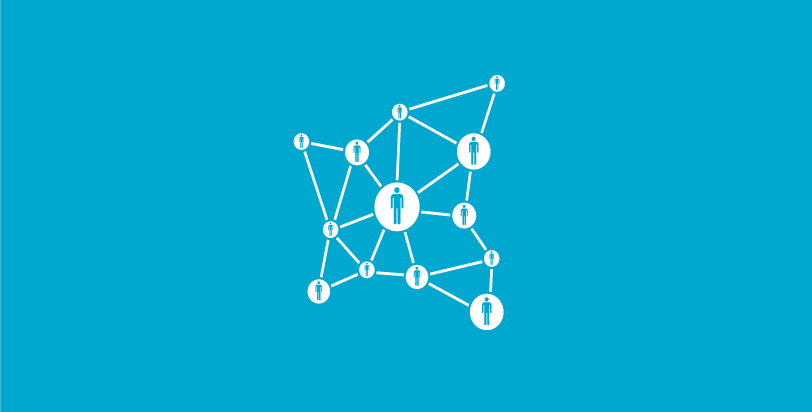Social media are becoming key platforms for communication between politicians and society. However, in addition to the option to complain about the bad roads directly to the people’s deputy on the Facebook messenger, social media also have a huge capacity to indirectly influence public opinion. Read below about the two most common tools to produce the impact – the networks of pages and bots .
When analyzing political ads on Facebook and Instagram disseminated during the 2019 parliamentary campaign, OPORA analysts noticed that some pages on the social media tended to “borrow” the materials from one another. Together, they make up certain groups (or networks) that often act simultaneously and share identical content for their followers. The phenomenon is gaining momentum in the Facebook’s Ukrainian segment. In the early 2020, OPORA noticed activity of such networks in favour of Viktor Medvedchuk, while at local elections Andriy Palchevskyi, a Kyiv city mayoral candidate, benefited from them, too.
However, upon the completion of major election campaigns, Ukraine saw the old networks of pages continue to strive (the network supporting Viktor Medvedchuk is still actively operating), but also the birth of new networks was striking. Thus, during the political ads monitoring OPORA detected four pages that stated the same telephone number of the advertiser: Старі Політики (lit. – Old Politicians), Новини України (lit. – News of Ukraine), Ньюз Тайм (lit. – News Time) and Про Україну (lit. – About Ukraine). The Старі Політики page is the only old-timer on Facebook (it was created back in September 2018). Three other pages popped up on the social media in November 2020: Новини України and Ньюз Тайм – on 26.11, Про Україну – on 27.11. The followers are distributed likewise: the oldest page Старі Політики has the most of followers (ab. 8,500), three other pages roughly number the 260 followers, each.
All the pages are actively using a tool of political ads. In the period from October, 26, 2020 to January, 23, 2021, the four pages shared the total of 175 promoted posts, and spent for them over USD 14,300 (about UAH 400,000). The costs are distributed in the following manner:
|
Page |
Costs, $ |
Number of promoted ads |
|
Старі Політики / Old Politicians |
2468 |
16 |
|
Ньюз Тайм / News Time |
3750 |
45 |
|
Новини України / News of Ukraine |
3839 |
57 |
|
Про Україну / About Ukraine |
4288 |
57 |
The analysis of the four pages with the help of the Crowdtangle analytical tool revealed to the social media monitoring experts from OPORA that the administrators of all pages were running them under the same plan: activity peaks of all pages fall onto the same days. Likewise, they are “silent” in a unison, too. The graph shows the days and the number of posts published by the four pages over the past three months:
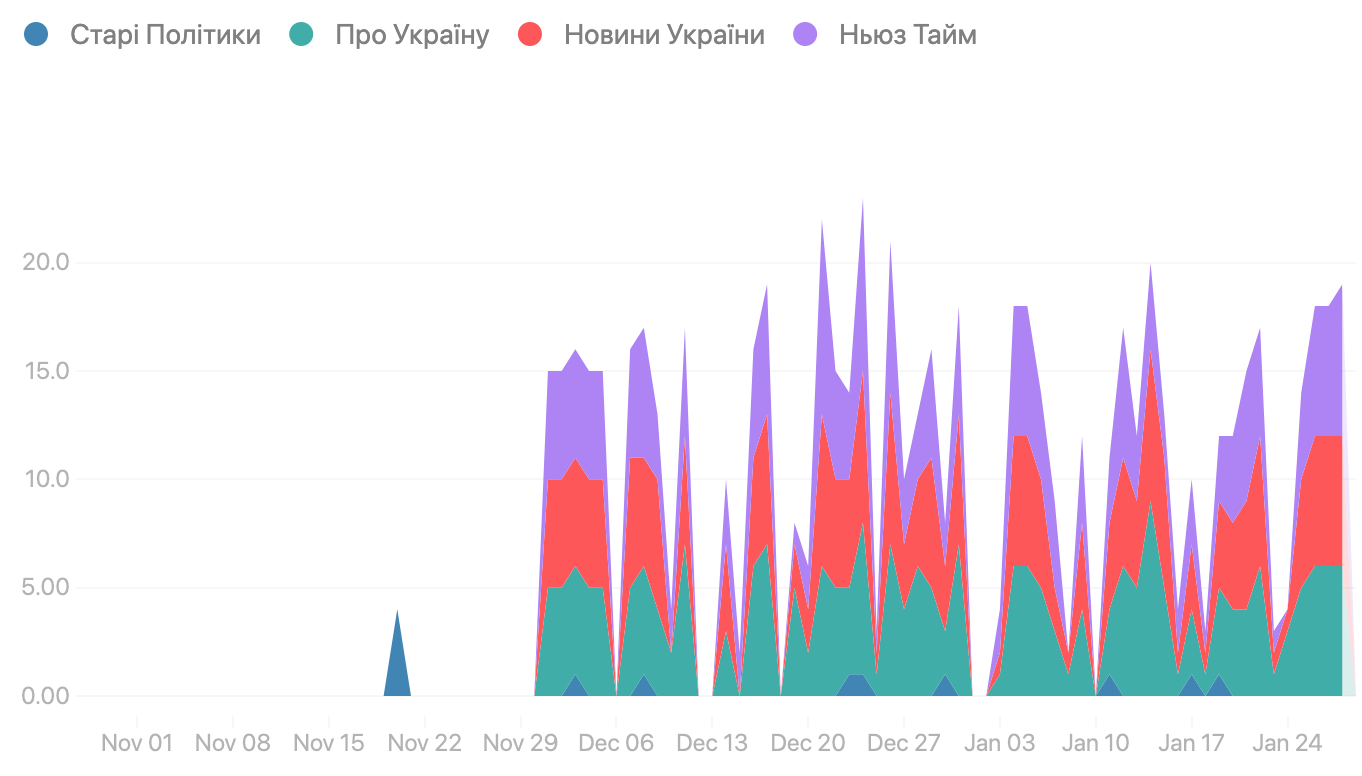
It is quite expected that all the four pages will peak in abnormal activity simultaneously. The following chart shows the timespans when users responded most actively to the page posts, such as marked their reactions, commented and reposted:
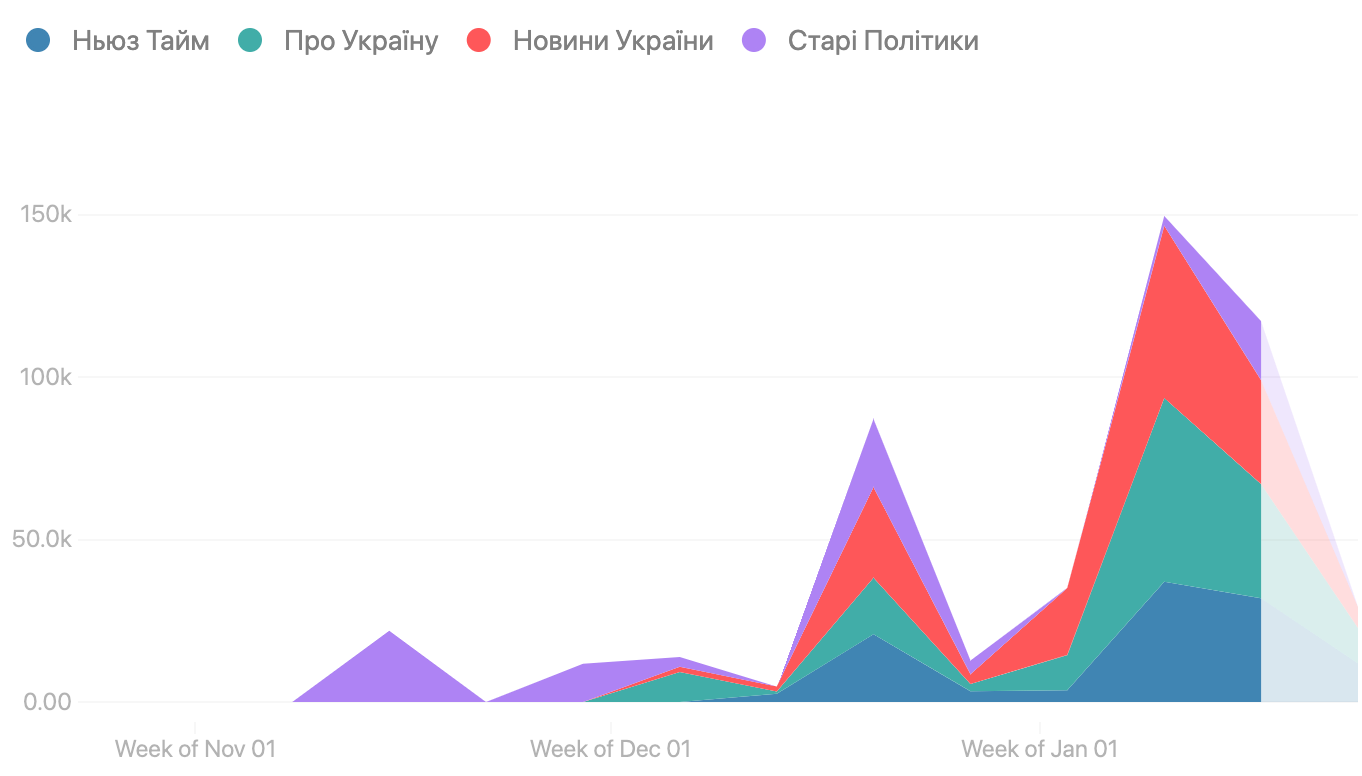
In addition, OPORA noticed some distinct features of this network. In case of networks supporting Andriy Palchevskyi or Viktor Medvedchuk, when the pages mostly promoted the same posts, this network promoted several key ideas (not necessarily shared the identical content on all pages).
Much of the content shared by the pages concerned the fifth President of Ukraine Petro Poroshenko. In most cases, ads accused the politician of the links to the Russian Federation and a politician Viktor Medvedchuk; they also emphasized his engagement in corruption:

Other posts were about the current President of Ukraine Volodymyr Zelensky. The posts highly praised the politician and highlighted his skill to consolidate the Ukrainian society and to successfully implement the planned reform:
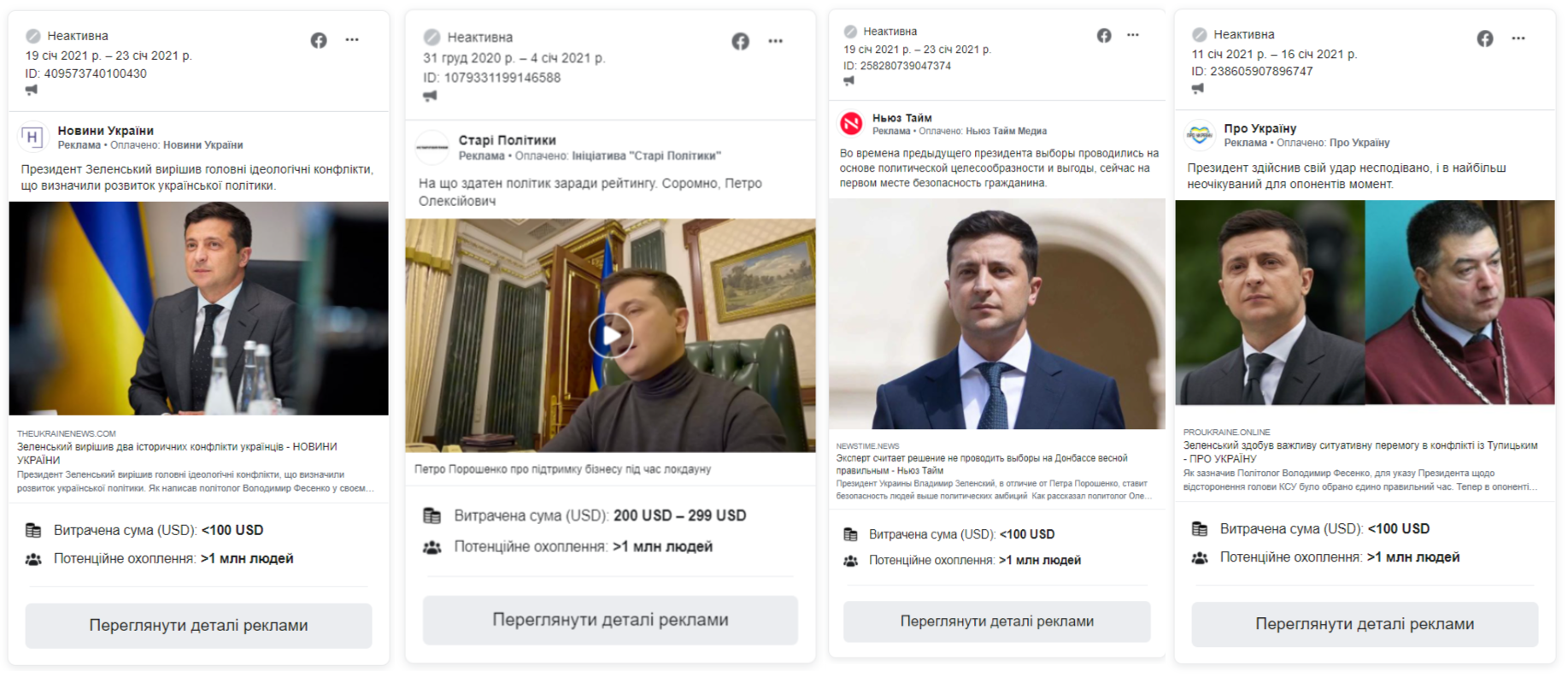
International events were covered by fewer posts. All the four pages were unanimously supporting the United States of America and personally the newly elected President Joe Biden; and spoke against the Russian Federation:
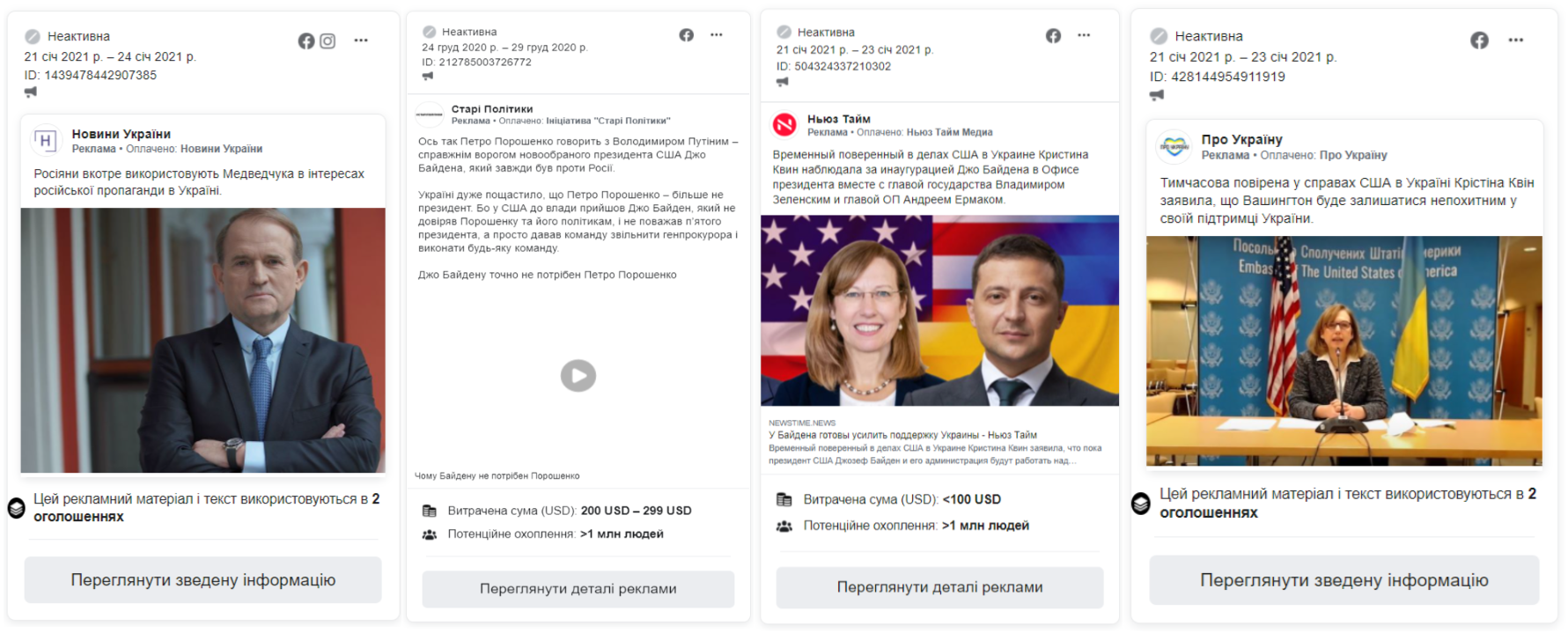
The Devil is in the Details: Why Some Posts Are More Popular Than Others
OPORA experts decided to explore into the causes for some posts getting thousand times more likes and comments than others. We selected for research the 20 most popular ads from the pages Старі Політики, Новини України, Ньюз Тайм and Про Україну that went viral, and analyzed over 13,500 comments. A rather large and extensive network of bots was revealed, and they produced artificial activity levels. Thus, out of 64 users leaving over 8 comments underneath, at least 38 were identified as bots.
We expected to have a large share of bots to support the opinions expressed in the posts. However, most of them had a different sense. The posts were mostly campaigning in favour of Volodymyr Zelensky, discredited Petro Poroshenko and compared him to Viktor Medvedchuk. At the same time, the commenters discredited the incumbent President Volodymyr Zelensky and spoke positively of Petro Poroshenko (some also commended Viktor Medvedchuk).
For example, the most active “user” that left 31 comments under the posts of all the 4 pages was Ludmilla Ptakhova who mostly responded to the content of posts in the following manner:
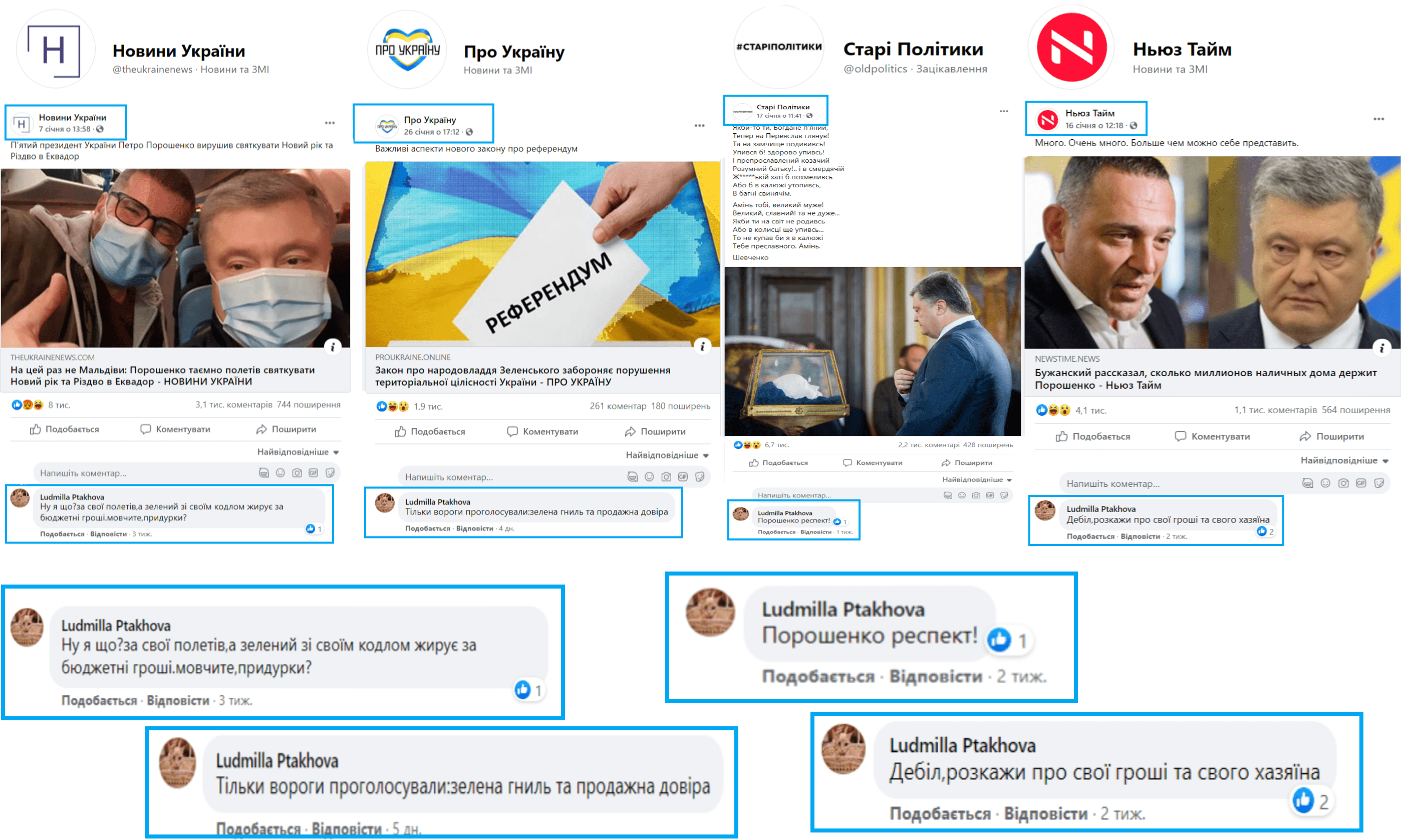
It shall be mentioned that Ludmilla’s page did not have any photos, friends or subscriptions.
The user under the nickname Margaret Thatcher must be not very supportive of Volodymyr Zelensky’s policies. She left 5 comments on three different pages to express her disagreement:
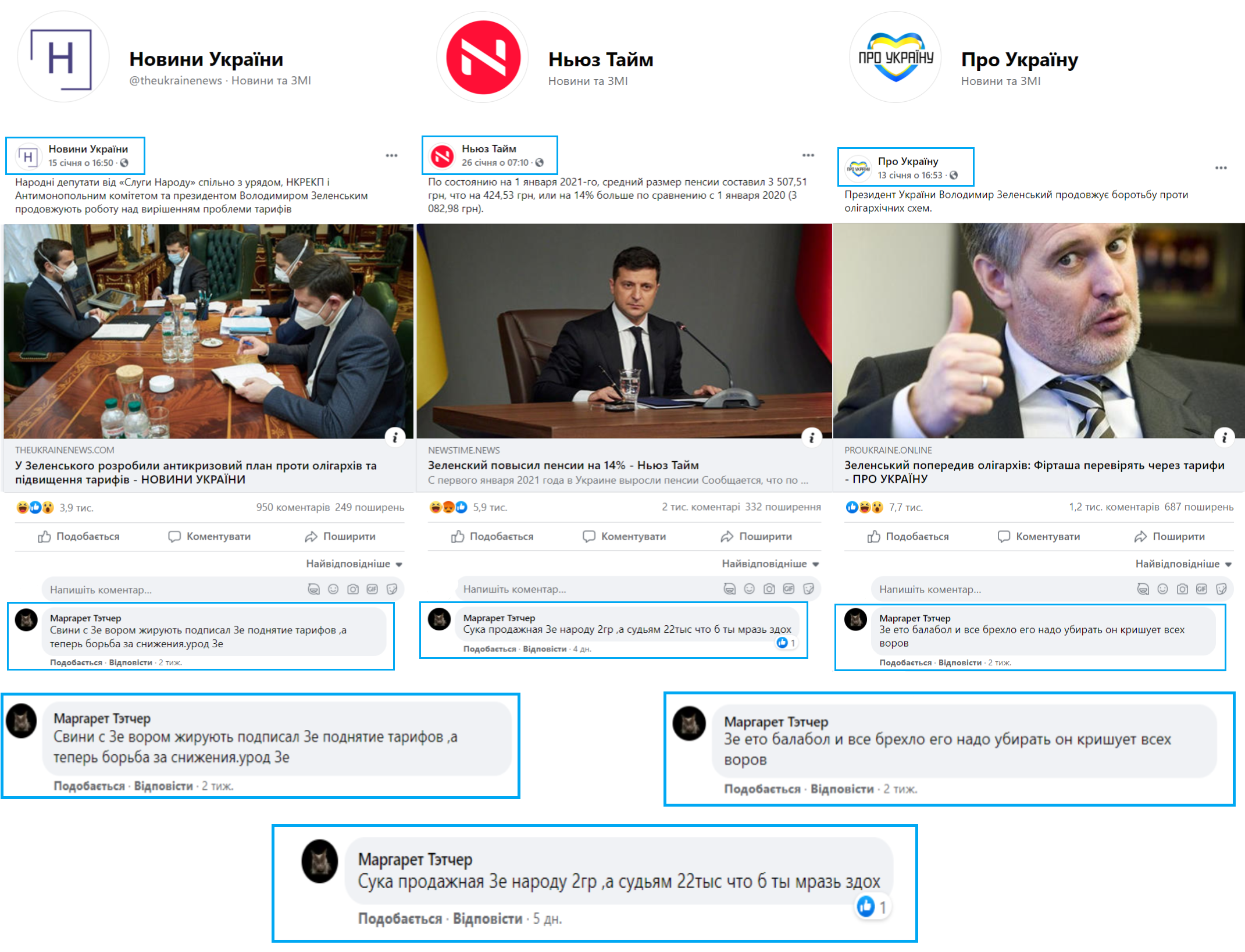
The Thatcher’s page includes multiple reposts of YouTube videos where the current President is accused of various misdeeds.
Likewise, OPORA also detected many other commenters that bore little resemblance to regular Facebook users: their pages hardly had any or no photos of real people, or conversely, they had too many of photos, they did not communicate with the followers and had many reposts from different Facebook groups. In particular, experts identified the pages that have elements of fake accounts: Влада Владовича (25 comments), Ніни Антонюк (19 comments), Тетяни Стрельцової (16 comments), Сергія Марчука (16 comments), or Петра Чербаджі (14 comments). Full list of the identified bots and analyzed comments can be viewed at the link.
It shall be noted that bots mostly left their comments on all the four pages rather than on one page only. In addition to political commenters, bots often shared various images under the posts, links or videos, such as Влад Владович (aka Bob Bobovych on the screenshots below) and Petro Oxrimenko:
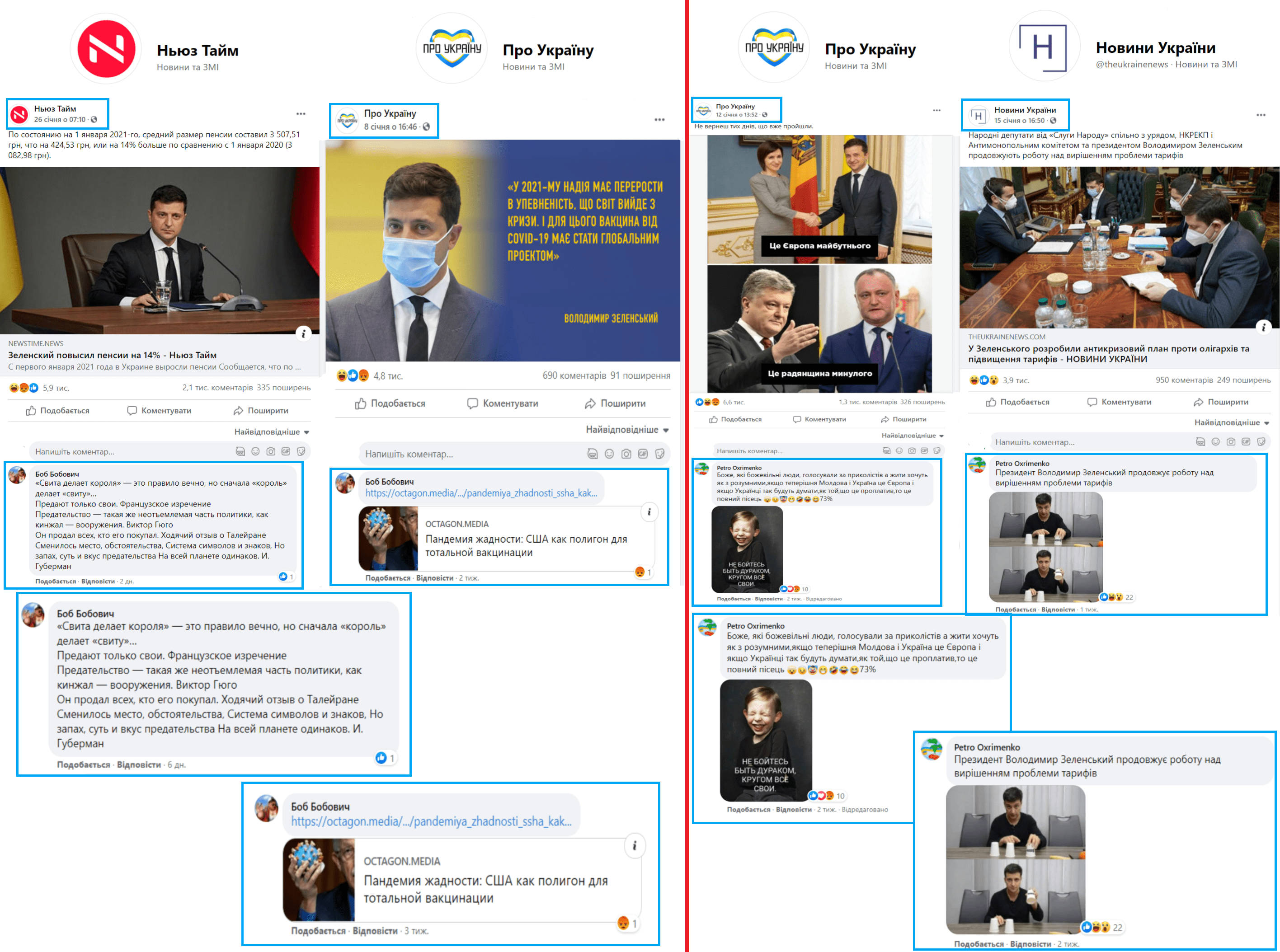
On the other hand, the biggest “surprise” of all was the page Владимира Скобелева who OPORA had identified as a bot in the previous study. At the time, he was actively supporting Viktor Medvedchuk. Now, he tried to discredit Petro Poroshenko and actively posted pictures under the posts that mentioned the previous President:
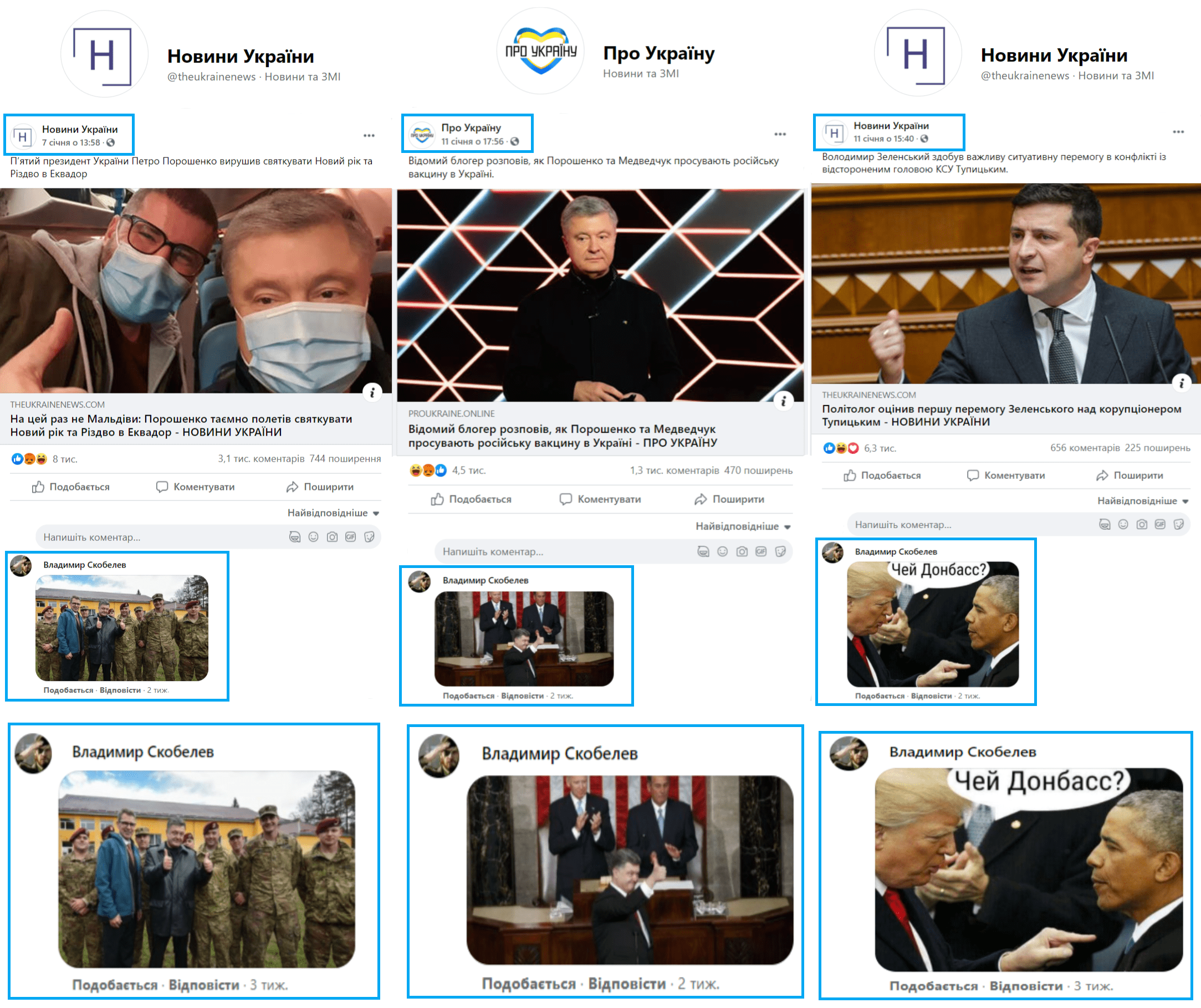
Bots were also increasing activity under the posts when shared the same posts to their pages dozens of times. Thus, the most ardent followers of the four pages (in addition to the “Old Politicians” page that has been there the longest) are Степан Яловега and Сергій Березний. The analysis of their posts on all the three pages (shared over 100 times) showed to OPORA experts the activity from the two accounts under roughly every post. For example, of the 347 shares of this post, 103 shares were made by these two fake accounts.
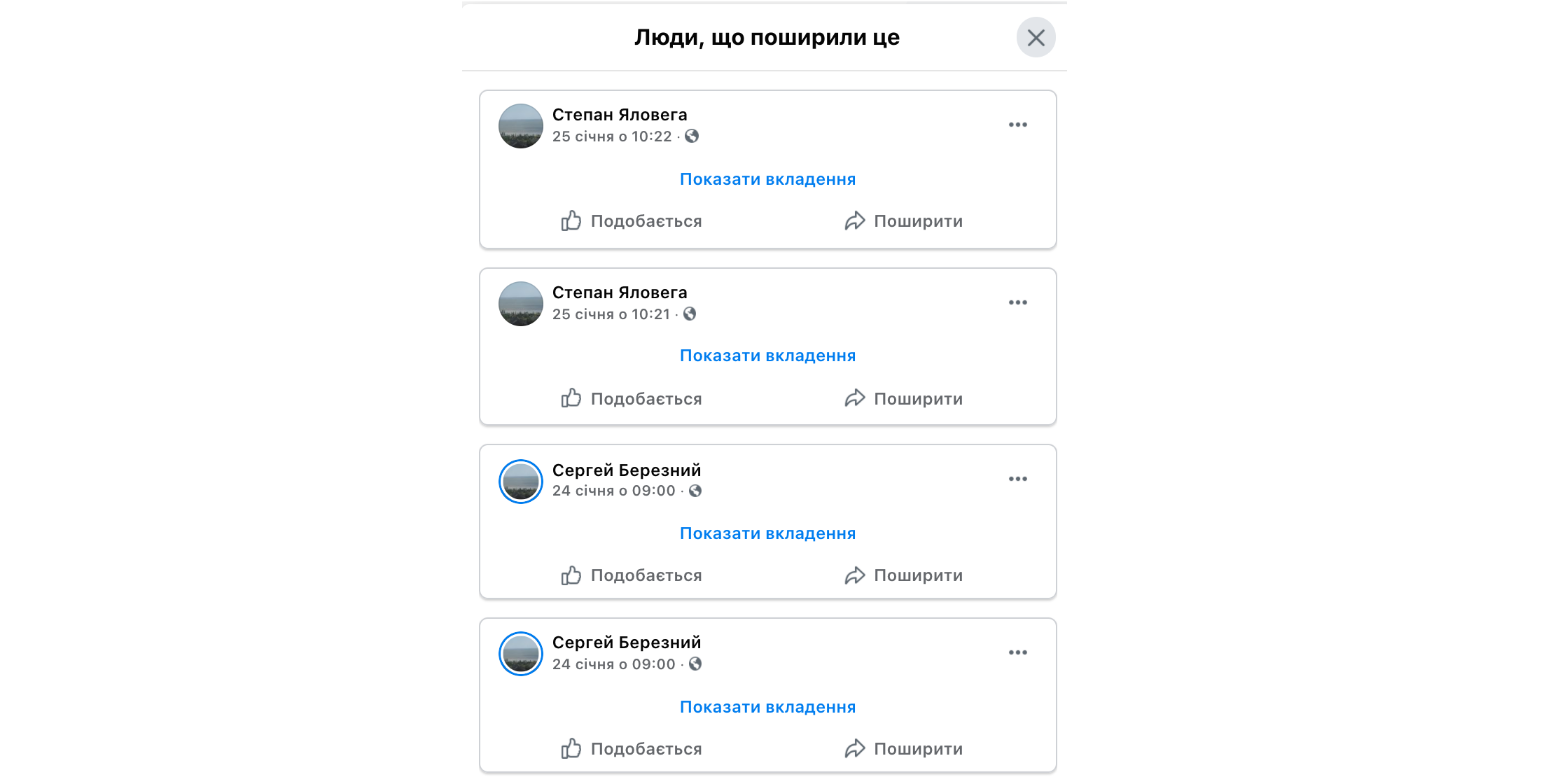
Find more audience in the regional communities
The facts known about this network of pages might produce an impression that the phenomena are insignificant. In addition to the “Old Politicians” page, other three pages have the total of about 600 followers, which is a rather modest scale for Facebook. Besides, high activity levels under the posts are largely imitated by fake pages. It may produce a false impression of the low impact of the pages as large costs for ads in the network fail to increase the outreach. However, when OPORA analyzed the sampled posts that were most actively shared by users we found almost 500 reposts into various Facebook communities created for communication and exchange of users to discuss the pressing issues. Of all the publications, 50 posts were sampled for analysis that were shared over 100 times. As a result, we found over 500 shares to the communities where each member may post any information to reach the communities’ audiences. Thus, we detected that the posts from these pages were most actively shared in 107 regional communities targeting residents of certain cities, districts, villages, or towns. For example, the community of “Луцьк Європейський” (lit. – European Lutsk) with 16,600 members had 17 shares of posts from this network of pages. The community “правда Онуфріївщини!!!” (lit. – The Truth of Onufriyivka Region) with 1,300 members created for citizens from Onufriyivka amalgamated hromada of Kirovohrad Oblast enjoyed 9 such shares.
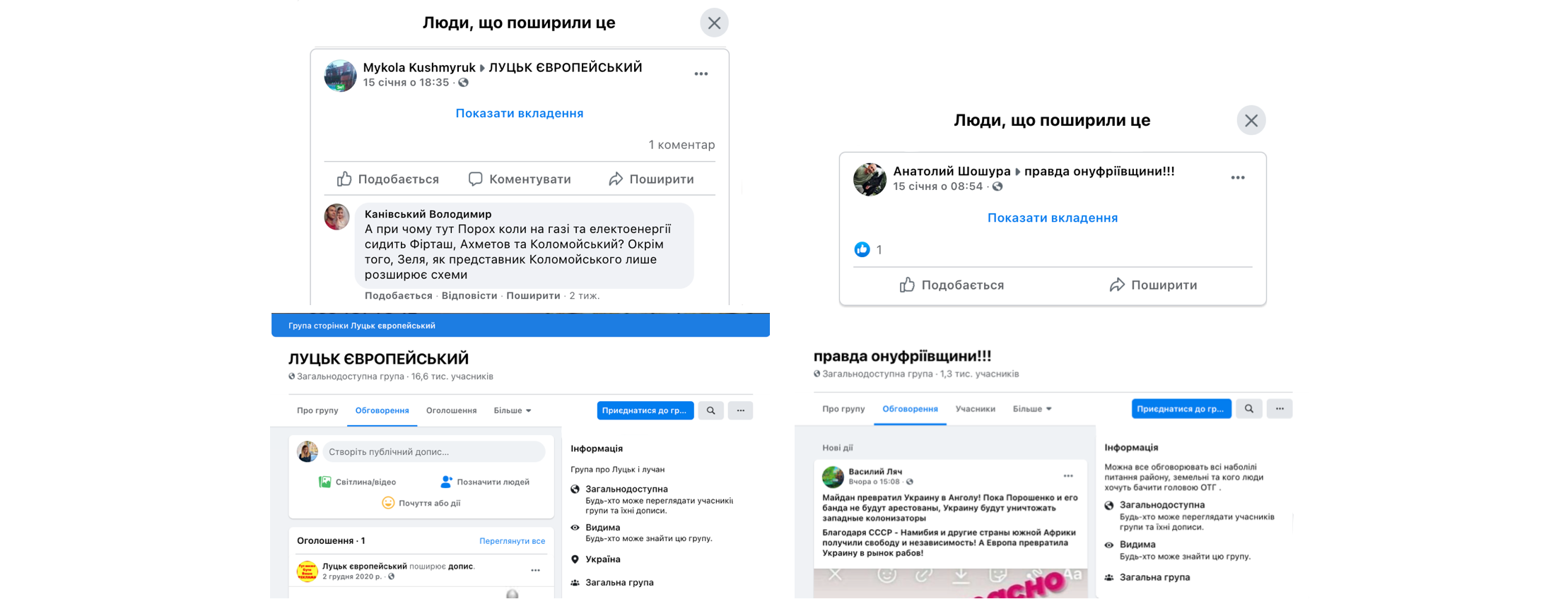
Moreover, OPORA found a group of communities created to support the President Volodymyr Zelensky. The sampling of the most frequently shared posts showed that 107 reposts were made into 40 user communities supporting the current President. For instance, 16 reposts were shared to the community “Президент України” (lit. – President of Ukraine) (46,000 members) owned by the public page of “Зе Info”; 7 reposts were made to each of the “6-й Президент України” (13,900 members) and “Команда “Зе” Змінимо Україну Разом!” (72,700 members).
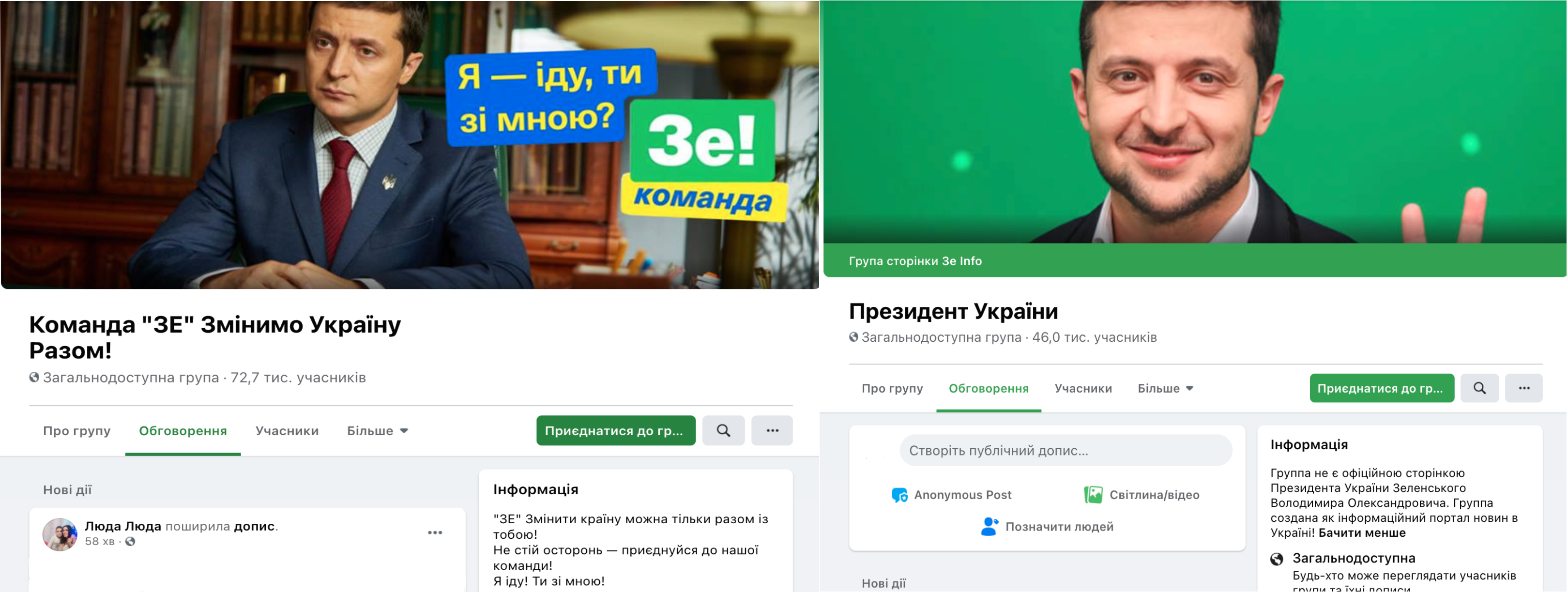
Not all comments and reposts from the pages were possibly made by fake accounts or bots, as some of them were shared by regular users who were genuinely supporting or objecting to the information in the posts.
There is a good reason that Facebook focuses on the monitoring and blocking of the coordinated activities of accounts, pages, and groups trying to influence public opinions. The activity on social media is especially dangerous as the use of fake accounts is a rather efficient tool to mislead the users and manipulate public attitudes to achieve certain political goals. The country’s information security is highly jeopardized by the activities of such fake accounts coordinated by foreign states. That is why we need to ensure national information safety with the help of education and awareness programs to increase the capacity of citizens in recognizing the disinformation and in withstanding it, while the law-enforcement bodies shall build a system to detect the activities of foreign sock puppet farms.
To remind, in December, Facebook blocked the network of 27 Facebook accounts, 37 pages, 21 groups and 13 accounts on Instagram.
Anastasia Romaniuk, Olha Snopok – experts in social media monitoring
